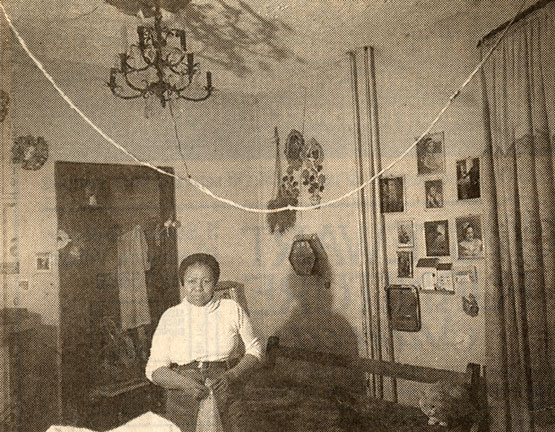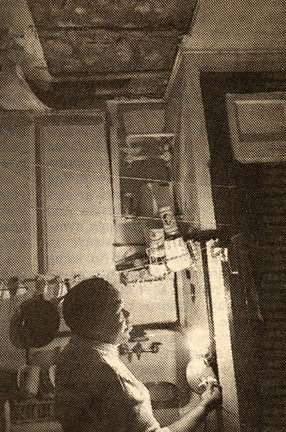The New York Times
January 21, 1996
By Bruce Lambert
Clinton
Since a recent fire, Amalia Torres gets electricity from a neighbor's
apartment.
For nearly 20 years tenants and
community advocates in Clinton
have fought the landlord Martin
Fine, whose buildings have been
cited for nearly 800 violations.
Now the battle is heating up in
court.
Photos: Ozier Muhammad
(The New York Times)
After battling for nearly two decades, tenants, advocates and city officials say they hope to soon end the reign of Martin Fine, whom they call one of the city's worst landlords. Their struggle has been marked by the death of a workman in the collapse of a Fine-owned building, mass arrests of drug dealers, hundreds of code violations and 10 days ago an arson fire that left some tenants homeless.
In recent weeks the city has joined the tenants in seeking a Housing Court order to name an independent manager for the block of long-neglected, half-vacant buildings owned by Mr. Fine's company, Friarton Estates. They are on the west side of Ninth Avenue from 37th to 38th Streets. A court hearing is set for Thursday.
The buildings, all walk-ups, have piled up nearly 800 violations for lacking heat and electricity and for having rats, a floor crack deep enough to see the apartment below and broken plumbing that has forced residents to draw cooking water from toilet bowls. In the 1980's dozens of drug-dealing squatters, who had overrun the buildings, were arrested in a police raid. As of last April, Mr. Fine owed $556,000 in back taxes and water bills.
The tenants, who remain in 25 apartments, accuse Mr. Fine of deliberately ruining his properties to force them out, so he can sell or redevelop the block. Tenants pay $200 to $300 a month for the one- and two-bedroom dwellings. Neither Mr. Fine, nor his lawyer, Bruce Lederman, returned repeated telephone requests for comment. "He's at the top of my list of bad landlords," said Community Board 4's housing committee leader, Katherine L. Gray.
Mr. Fine failed in his effort to have the tenants' suit transferred to Federal Bankruptcy Court from Housing Court, which would have decreased the likelihood he would have to pay for repairs on the buildings. A Bankruptcy Court judge rejected his request as evasive. Mr. Fine has appealed.
Last April a workman died in the collapse of a Fine-owned building near the Lincoln Tunnel. City officials then ordered three more buildings torn down as unsafe, leaving eight standing. Mr. Fine then opened an unlicensed parking lot on the demolition site, city officials say. They have begun a civil action against him. On Jan. 11 a blaze that fire officials ruled as arson destroyed several apartments at 493 Ninth Avenue. Other apartments were left with collapsing ceilings, water damage and power outages. "There's a long history of fires in these buildings that have helped the landlord" to empty apartments, said Robert Kalin, a tenant organizer for Housing Conservation Coordinators, a nonprofit group. MFY Legal Services, which represents them, said Mr. Fine and his managers have ignored requests to seal empty apartments, jeopardizing lives of tenants and firefighters.
Some neighbors want the buildings removed, but tenants say that would dislocate them and reward Mr. Fine. Local merchants are desperate to see something done about the blighted block. A five-year plan calls for reopening shuttered storefronts with about $250,000 from a rent escrow fund and using rent from the stores to help pay for $1.3 million in repairs. Joe Restuccia, executive director of the Clinton Housing Development Company, a nonprofit group, is the tenants' nominee to manage the properties. "That's the whole linchpin for saving these buildings," he said of the plan.

